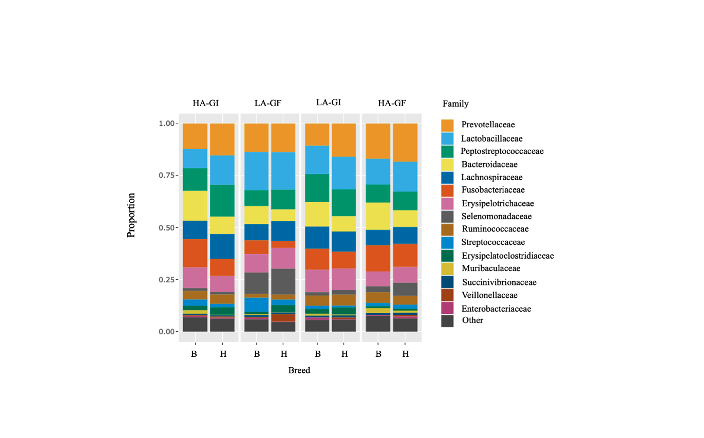
The impact of protein source and grain inclusion on digestibility, fecal metabolites, and fecal microbiome in adult canines
BSM Partners' veterinarians and scientists have teamed up with the University of Illinois for their most recent publication, which investigated grain-free/pulse-rich diets pulse-free/grain-inclusive diets and varying amounts of animal-sourced protein on digestibility, fecal metabolites, microbiota, and fecal characteristics in 64 dogs.
The peer-reviewed article, which appears in the Journal of Animal Science, includes data that varying in carbohydrates and amount of animal protein were all highly digestible and the fiber content in pulses and legumes did not negatively affect digestibility. What was once thought of as fiber that would lead to taurine deficiency during loss in conjugated taurine, did not demonstrate a significant impact. Additionally, the diets that were pulse-rich had a higher production of short-chain fatty acids from the type of nutrients naturally found in pulses and legumes. Those who have speculated pulses have negative effects on gut health and digestibility and thus nutrient absorption was not observed in the newly available study.
In the latest press release:
Dr. Stephanie Clark, PhD, CVT, PAS, CFS, Dpl. ACAS, VTS (Nutrition) of BSM Partners, an article co-author and a board-certified companion animal nutritionist, said, "This long-duration, controlled prospective study provides important insights that will inform the scientific community's ongoing work to better understand and improve canine health."
For the study, researchers formulated four canine diets. Two diets were grain-free, contained pulse ingredients and potatoes, and included either low or high amounts of animal protein. Two diets were grain-inclusive, contained no pulse ingredients or potatoes, and included either low or high amounts of animal protein. The study aimed to evaluate macronutrient digestibility, fecal characteristics, fecal metabolites, and fecal microbiota in Beagles and mixed-breed hounds when fed extruded diets containing different inclusion rates of animal protein and plant-based ingredients.
Dr. Maria R. C. de Godoy, an article co-author and Associate Professor of Companion Animal and Comparative Nutrition at the University of Illinois, noted, "High inclusion of pulses as the primary sources of carbohydrate and protein in extruded diets for adult dogs resulted in pronounced shifts in fecal microbiota and metabolites, particularly, increased concentration of short-chain fatty acids that are beneficial for gut health."
Clare Hsu, an article co-author and doctoral student in Dr. Godoy's lab, said, "Fecal concentration of primary bile acids also increased with high pulse inclusion. This finding is consistent with previous literature evaluating the effects of pulses or grain-free diets on fecal metabolites and microbiota."
Follow us on LinkedIn for the latest updates on all things happening here at BSM Partners.
About the Author
Dr. Stephanie Clark is a board-certified companion animal nutritionist, veterinary nurse and nutrition specialist, a pet owner, and a mother who had a baby during the formula shortage. She has spent the past almost two decades dedicating her career to the welfare of pets, livestock, and wildlife. She currently provides nutritional consultations for veterinary clinics and works in the pet food industry.
This content is the property of BSM Partners. Reproduction or retransmission or repurposing of any portion of this content is expressly prohibited without the approval of BSM Partners and is governed by the terms and conditions explained here.